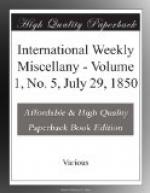* * * * *
SKETCH OF A STREET CHARACTER OF CAIRO.—The Caireen donkey-boy is quite a character, and mine in particular was a perfect original. He was small and square of frame, his rich brown face relieved by the whitewash of teeth and the most brilliant black eyes, and his face beamed with a merry, yet roguish expression, like that of the Spanish, or rather Moorish, boy, in Murillo’s well known masterpiece, with whom he was probably of cognate blood. Living in the streets from infancy, and familiar with the chances of out-door life, and with every description of character; waiting at the door of a mosque or a cafe, or crouching in a corner of a bazaar, he had acquired a thorough acquaintance with Caireen life; and his intellect, and, I fear, his vices, had become somewhat prematurely developed. But the finishing touch to his education was undoubtedly given by the European travelers whom he had served, and of whom he had, with the imitativeness of his age, picked up a variety of little accomplishments, particularly the oaths of different languages. His audacity had thus become consummate, and I have heard him send his fellows to —— as coolly, and in as good English, as any prototype of our own metropolis. His mussulman prejudices sat very loosely upon him, and in the midst of religious observances he grew up indifferent and prayerless. With this inevitable laxity of faith and morals, contracted by his early vagabondage, he at least acquired an emancipation from prejudice, and displayed a craving after miscellaneous information, to which his European masters were often tasked to contribute. Thrown almost in childhood upon their resources, the energy and perseverance of these boys is remarkable. My little lad had, for instance, been up the country with some English travelers, in whose service he had saved four or five hundred piastres, (four or five pounds), with which he bought the animal which I bestrode, on whose sprightliness and good qualities he was never tired of expatiating, and with the proceeds of whose labor he supported his mother and himself. He had but one habitual subject of discontent, the heavy tax imposed upon his donkey by Mehemet Ali, upon whom he invoked the curse of God; a curse, it is to be feared, uttered, not loud but deep, by all classes save the employes of government. His wind and endurance were surprising. He would trot after his donkey by the hour together, urging and prodding along with a pointed stick, as readily in the burning sandy environs, and under the noonday sun, as in the cool and shady alleys of the crowded capital; running, dodging, striking, and shouting with all the strength of his lungs, through the midst of its labyrinthine obstructions.—The Nile Boat.
* * * * *




